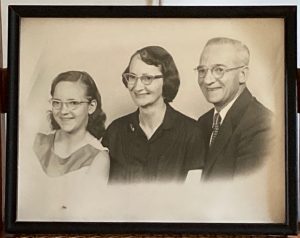I’ve spent much of the last few weeks virtually “with” voters in North Carolina. Some call into a hotline, some need to fix invalidated absentee ballots, and some need training to help track those folks down. The absentee ballots could well swing the close election, and they are usually easily “cured.” The voters’ accents and voices take me right back to 1956, when my Canadian parents and I moved there from Dayton, Ohio, driving over the Smoky Mountains with my cocker spaniel, Honey, in the back seat with eight-year-old me.

It didn’t take long for us to discover that we were living in a totally new environment that we didn’t understand at all. Why were drinking fountains and rest rooms reserved only for whites or “colored”? My mother’s bad back prevented her from doing the “heavy housework.” When she went to the state employment office to look for help, they were outraged that she insisted on paying the minimum wage, four times what they recommended (one dollar an hour rather than a quarter). It was assumed that any domestic help would, of course, be black and female. My father, newly Assistant Director of the Duke Gardens, soon advocated successfully for the all-black workforce, both to improve wages and provide for basic literacy.
Although we did meet some middle class black families, especially when my mother taught at the local college, the people who influenced me most were more typical of North Carolina’s population. Mrs. Lily Stearns helped out at home and took care of me when my mother was working. She offered so much that my own mother could not: an even, steady presence; a tolerance for human foibles; and a necessarily flexible attitude about coping with whatever life dished out. A highly intelligent and well educated woman, she should have had far more opportunities. When Daddy and I took Mrs. Stearns home, we witnessed the unpaved city streets with outhouses behind the dilapidated housing “on the other side of the tracks”. Even more importantly, I learned how people living in these conditions could have strength and dignity, how they could spread love and make the world brighter and better. How they could reach out to a lonely little girl from the North and make her feel right at home.
Every Saturday, Daddy took me to work with him for the morning, and left me in the care of the foreman, Mr. Glasgow Bowie and his crew. My favorites were Mr. Glasgow himself, James Garner and Hardy Saunders, all big, ample men who loved children. It pains me that I have no photographs of them, but let this image of their work represent them.

Sarah P. Duke Gardens in Spring
They let me explore under the hemlocks or behind the big rhododendron bushes all I wanted, as long as I checked in from time to time. When I brought them some marvel like a pine cone, they treated it like a treasure. I heard them singing spirituals as they worked: “Old Father Abraham setting in his chair, I’se a-coming soon!” “Nobody knows the trouble I’ve seen.” They echoed Paul Robeson who was often playing in our home. The fact that my father left me in their charge week after week made a bond between him and them that time and distance never severed. He was in touch with them until the end of their lives, briefer even than his own.
Now, decades later and in a new century, I hear their voices once more. These callers are the descendants of the generation of Mr. Glasgow and his crew, of Mrs. Stearns. Of course I am not positive of which callers are black, but most probably are, just from the way they talk. An elderly woman who is absolutely determined to vote writes down the address of her polling place one letter at a time. A gentleman who could be her son reproves me when I suggest early voting: “I’ve always voted on November the Third.” A young fellow in the next generation is right on it when I tell him his ballot won’t be counted unless he fixes it. He’s got the website and he is ready to go!
As I monitor the questions on the hotline, I shudder at the past and present obvious voter suppression: the friendly Trump supporter with the hunting knife, the right wing radio blasted loud enough to hear inside the polling place, the woman who is told she can’t vote early to “cure” her absentee ballot (of course she can!). I saw how some of my white classmates treated the people I knew and had come to love, and who loved me. Nothing I hear on the phone surprises me.
Elevating such issues so they can be dealt with is fulfilling, but even answering the most mundane question brings me joy. I love hearing the voices of the people who gave me so much, and I hope my parents are watching me.

Your article — beautifully and evocatively written — brought tears to my eyes and pride that you are one of my “sisters” at SheWritesPress.
Barbara, thanks so much for your comment. I really value your opinion as you know because I so admire you work and your writing. Hugs to you.